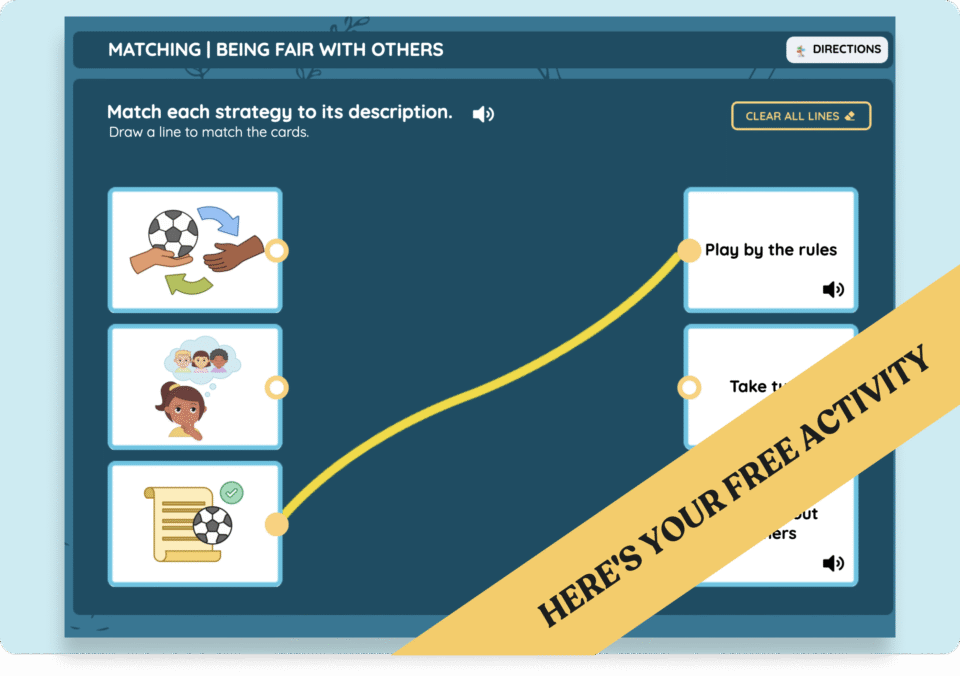Resources for Teaching Social Intimacy & Relationships to Students with Communication and Emotional Differences
Get free social skills materials
No-prep lessons on self-regulation, emotional recognition, conversation skills, and more.
Sign up hereWhen working with adolescents and young adults who have communication, social, and emotional differences, concerns arise around the issue of social and sexual intimacy and health. Students at the high school level are very much interested in dating, just like their peers. My co-workers and I found ourselves wondering how we are going to teach the abstract concepts of relationships. We put together a team of special education teachers, myself (the SLP), and the school psychologist to find resources. I want to share what we’ve found and give some tips on implementing the lessons. Since we haven’t begun the actual teaching yet, this post is about some of the different options at your disposal. We’ll soon have a follow up blog post with some updates on the results.
The Circles Curriculum
The Circles Curriculum is a curriculum intended for students with mild to moderate cognitive impairment to learn the social concepts of personal space, social distance, and social/sexual concepts. It was written by teachers, counselors, and consultants. The program teaches concepts through six color coded concentric circles which is a nice visual for students to see and understand. The program can be used with students who have learning disabilities, or cognitive, emotional, sensory, and/or affective impairments. I’m starting Level 1 with my students in the upcoming weeks. There is a follow up program called Level 2 which features more in depth skill building in the area of social relationships.
Level 1 is divided into two parts: Social Distance and Relationship Building. The aim is to teach students to understand social distance by seeing the difference between the colored circles and themselves. Lessons focus on relationship boundaries and relationship-specific behaviors. Boundaries are broken down into three “three T’s”; touch, talk, and trust. Specific examples of how you touch, talk, and trust people within different circles are given. For example, for someone who is a family member you would touch lovingly but not romantically, talk to about any subject including personal matters, and trust fully.
Relationship Building focuses on how relationships vary and build over time as well as how everyone has a choice in building relationships. These skills are important for physical and emotional safety. The Circles Curriculum offers additional resources, including Level 2, which includes more advanced Intimacy & Relationships. The curriculum also has standalone programs titled: Stop Abuse, and AIDS Prevention.
Make your own resources
I recommend making your own visuals so you can individualize them based on your students/children. Make color coded cutouts of circles and put pictures of them in. For example, the most private circle consists of the individual, so put a picture of the student. The next circle includes the closest people- family. So include pictures of family members. Also, ask your school is they are familiar with the program and could share some knowledge with you. If teaching about puberty and growing up have students bring in pictures of themselves as infants, children, and then adolescents. This will allow them to see the changes their bodies have made.
Practice the Basics of Social Skills
Having a solid understanding of basic social skills is important for students to develop healthy relationships. Students need to be able to ask questions, express themselves, listen, and understand emotions first in order to form relationships with others.
Practice conversation skills, listening exercises, giving compliments, and apologizing. Role playing situations is a great way to do so. To practice recognizing feelings run through flashcards of different facial expressions or talk through times they have felt sad, happy, etc. Break down how they looked and felt at the time. There are plenty of resources online and apps that practice these skills.
- ABA Emotions Flashcard app for iPad
- Emotions by Alligator Apps for iPad
- Let’s be Social (shameless plug) – Our app allows you to create your own lessons. Using your own images may help reduce ambiguity.
- Feelings House Worksheet from Jill Kuzma
- Social Fortune or Social Fate: A Social Thinking Graphic Novel Map for Social Quest Seekers – Awesome book based on Social Thinking concepts made with anime style pictures! High schoolers love this book!
Stay tuned to see updates on how the lessons went, more resources to use, and tips for teaching these tricky subjects!

